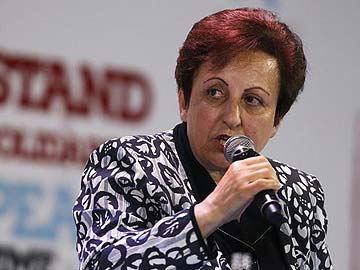November 08-2013

Nobel laureate Shirin Ebadi has expressed fear that the major powers have forgotten all about human rights in Iran as they focus on corralling Iran’s nuclear program.
In an interview Monday with Reuters, she worried that the major powers will sign a nuclear agreement with the Islamic Republic and just drop the issues of prison torture, frequent executions, mistreatment of women, suppression of speech and a host of other human rights issues.
Such issues have faded in international discourse about Iran in recent years. The UN special rapporteur on human rights, Ahmed Shaheed, continues to issue his damning reports and the US State Department puts out its annual report on human rights each spring. But apart from that, governments—as opposed to private organizations—have generally turned silent.
Even Israel, which one would expect to flay Iran over human rights violations, has turned silent under the shadow of Prime Minister Binyamin Netanyahu’s fixation on the nuclear issue. The US government has even been criticized for saying little about three American citizens confined in Iran.
Ebadi also criticized the economic sanctions imposed on Iran. “Economic sanctions have impacted powerfully,” Ebadi said. “People have become very poor. Some kinds of medications cannot be found in Iran. The price of food is higher in Iran than in the US or Europe.”
The sanctions that are harming ordinary Iranians should be replaced with ones that weaken the government, but not the people, she said.
Asked what those might be, she suggested barring Iran from using US and European satellites to broadcast programs in more than a dozen languages outside the country. “We have to stop the government of Iran from being able to use the satellites,” Ebadi said through an interpreter. “This way we can close down the propaganda microphones of the government.”
She didn’t explain how that would pressure the government to change its nuclear or human rights policies. Furthermore, most major satellite firms have booted Iran’s stations off already. But Iran can still stream its programs over the Internet.
Ebadi also suggested that senior government officials, from deputy minister up, should face travel bans and asset confiscations when they have funds deposited with European and American banks. Many already do. Those were the sanctions that the UN, EU and US started with several years ago in an effort to pressure Iran, but they had no visible impact.
Those sanctions were not imposed on all deputy ministers and ministers but on all officials who were identified as having a role in Iran’s nuclear program and in violations of human rights. Hundreds have been impacted, more than the dozens who hold the ranks of deputy minister or minister.
There are basically three kinds of sanctions that can be tried to coerce a country into complying with international mandates. One is economic, which is the current focus when dealing with Iran. The second is military, which is what the Big Six are trying to avoid. And the third is politico-social, including the sanctions Ebadi mentioned and such others as booting a country out of the Olympics or World Cup, and halting all international flights into or out of a country. The goal there is to arouse a nation’s people to the fact that its government’s policies have made the country a pariah and international outcast. Ebadi didn’t mention the full range of such sanctions.
Ebadi, 66, has been living in exile in Britain since 2009. She left Iran the day before the 2009 presidential elections and was advised by her supporters not to return when the post-election protests erupted.
In the interview, she expressed disappointment with President Rohani. “The motto of Mr. Rohani was that he was going to change the conditions and this is why people voted for him,” she said. “Unfortunately that’s not what happened.” Rohani had been in office three months and one day as of the interview.
Ebadi cited the number of executions in Iran since Rohani’s June election, saying it was twice what it was a year ago. Despite the release of 20 political prisoners, she said nearly all of the opposition activists in prison before he was elected are still in prison and religious and ethnic minorities continue to be persecuted.
Ebadi cited figures from the International Federation for Human Rights (FIDH), which reported that over 200 people, including as many as four minors, were executed between June 14 and October 1. She said it was double the number of executions that took place in the same period in 2012.
Executions and detentions are under the purview of the Judiciary and Iranian presidents have no say in such matters.
Ebadi said, “Unfortunately the world focuses on nuclear energy more than human rights and does not pay attention to the situation of violations of human rights in Iran. And this is why the human rights conditions are worsening in Iran.”
When the international talks with Iran began 10 years, they involved human rights as well as the nuclear topic. In fact, human rights dominated at the start, with stoning the first topic to be focused on. But as time marched on and Iran’s nuclear program expanded, the nuclear topic came to the fore and human rights has not even been mentioned for years now in the Big Six forum.
Ebadi said the Big Six should be discussing more than nuclear centrifuges. She warned EU nations not to rush to restore ties with Tehran’s government without first seeing improvements in Iran’s human rights record.
“My question for European countries is: what if they agree with the government of Iran on nuclear issues?” she asked.
“Are you willing to shake hands with a government that stones women? Are you going to trust a government that executes its political opposition? Are you willing to compromise standards of human rights, that you believe in, for your own security?”
